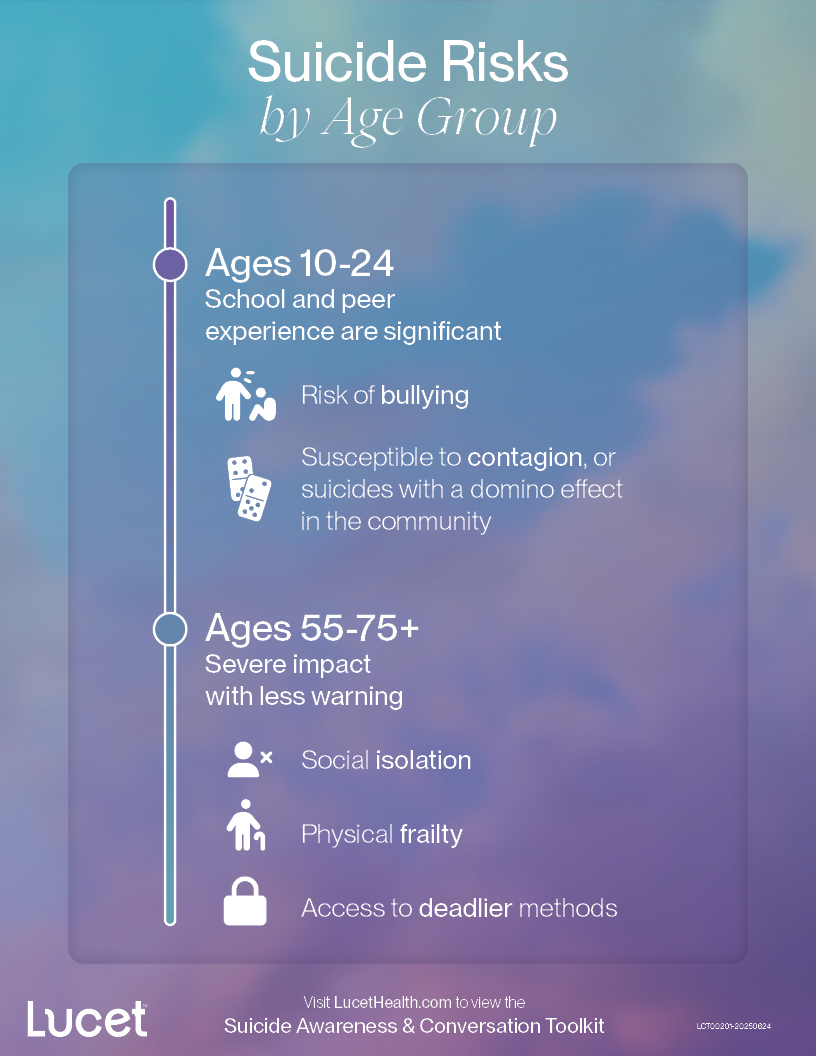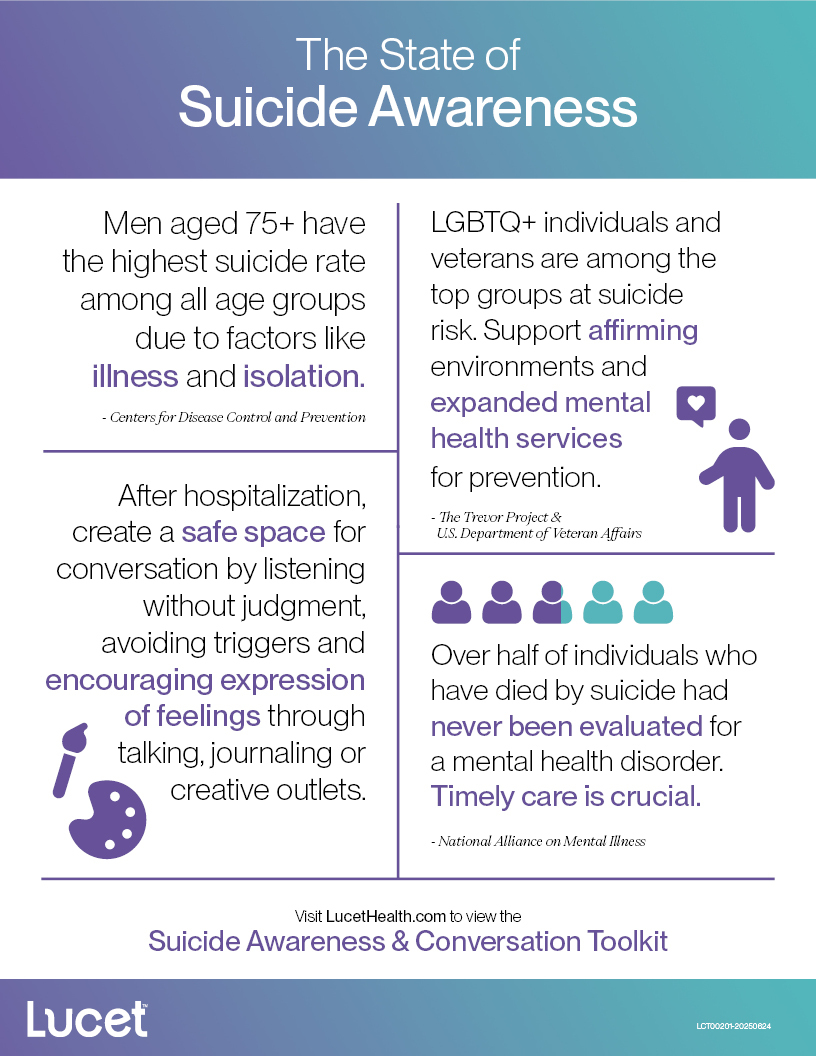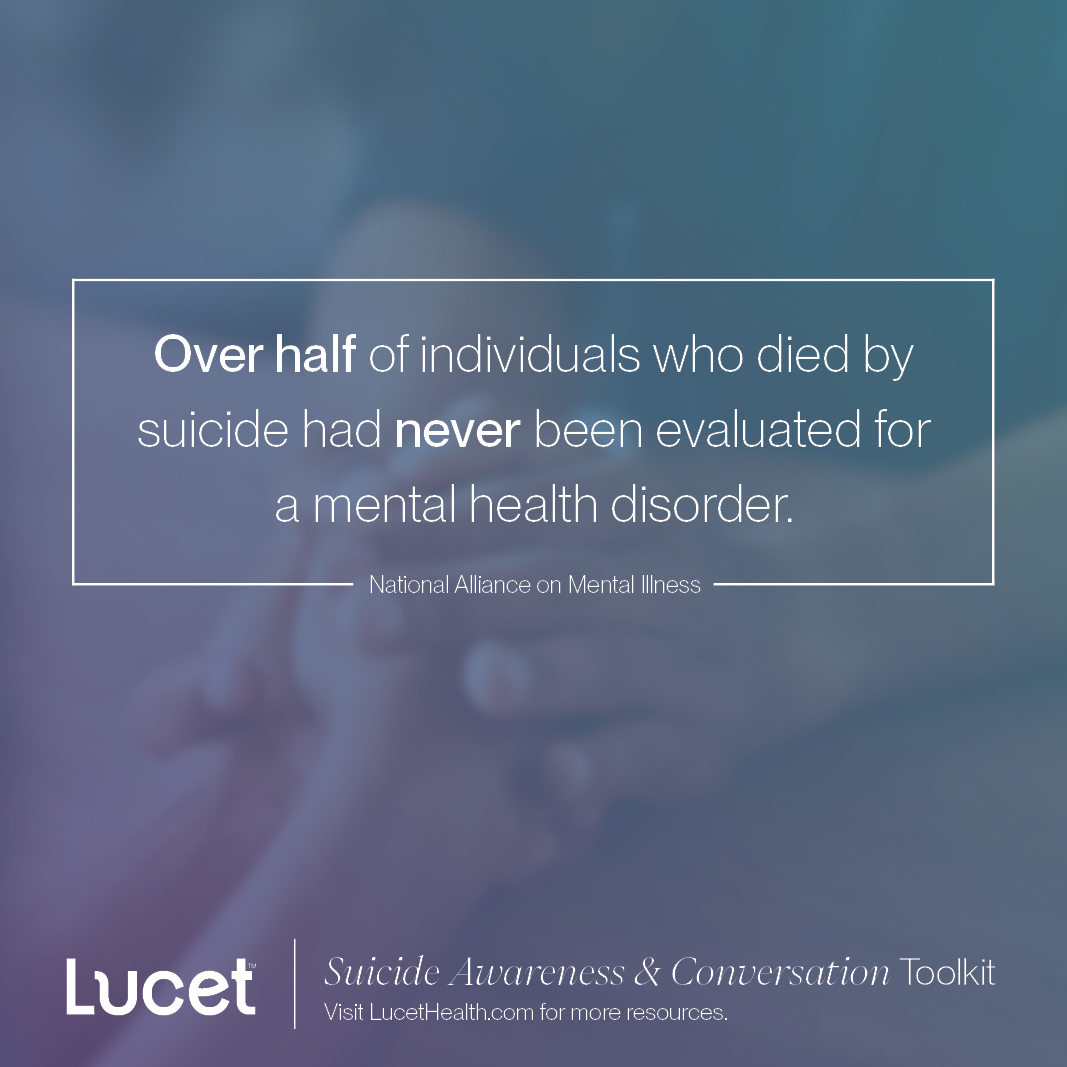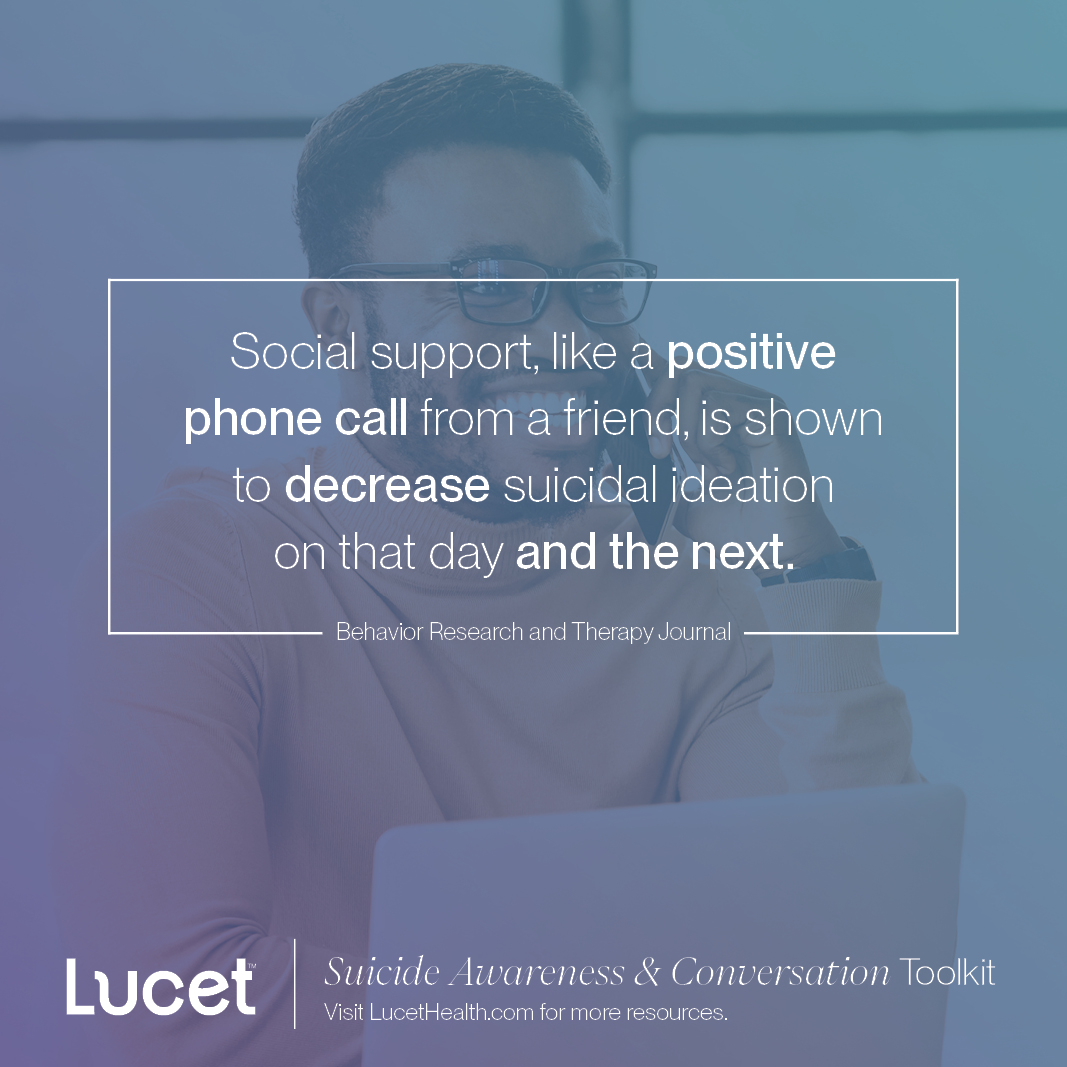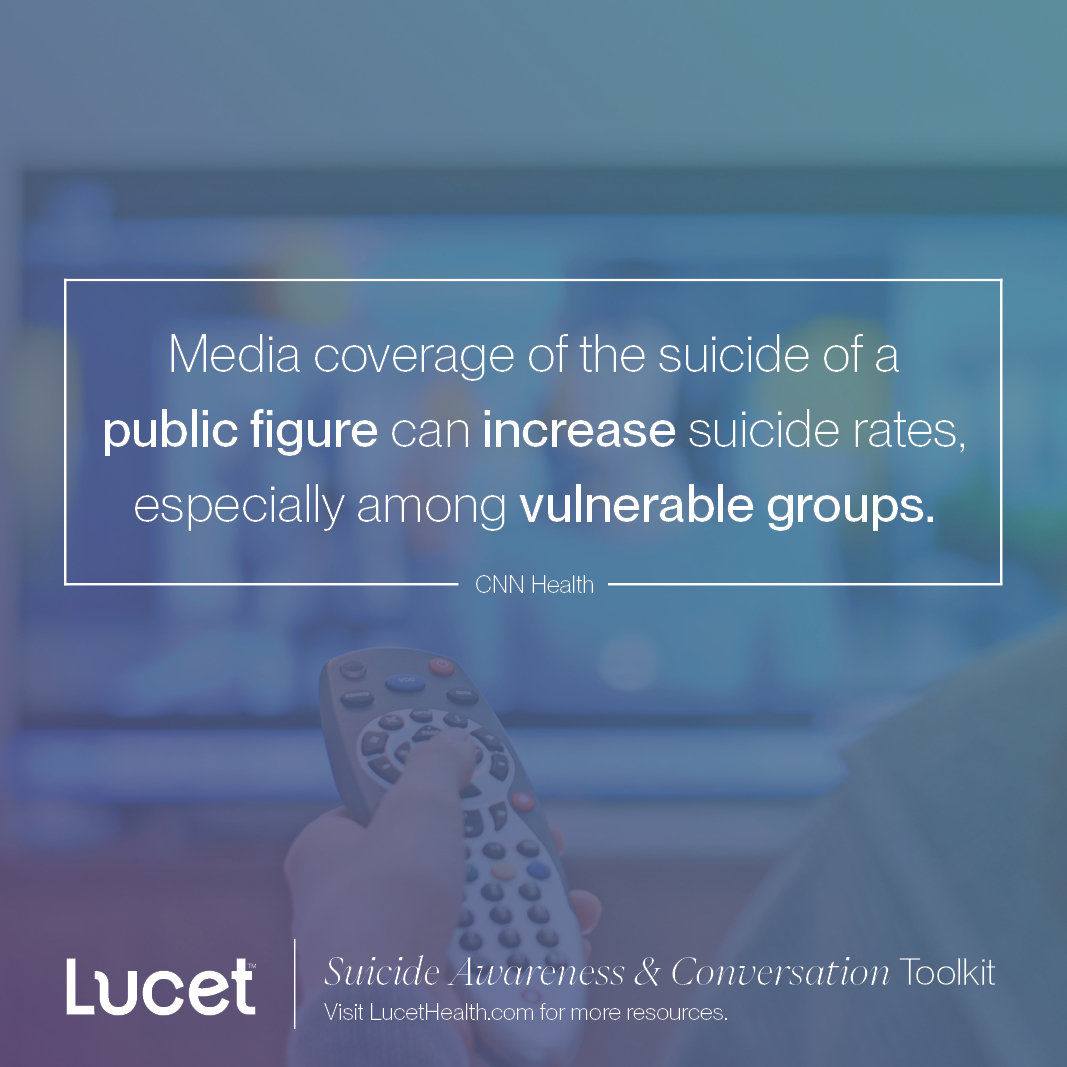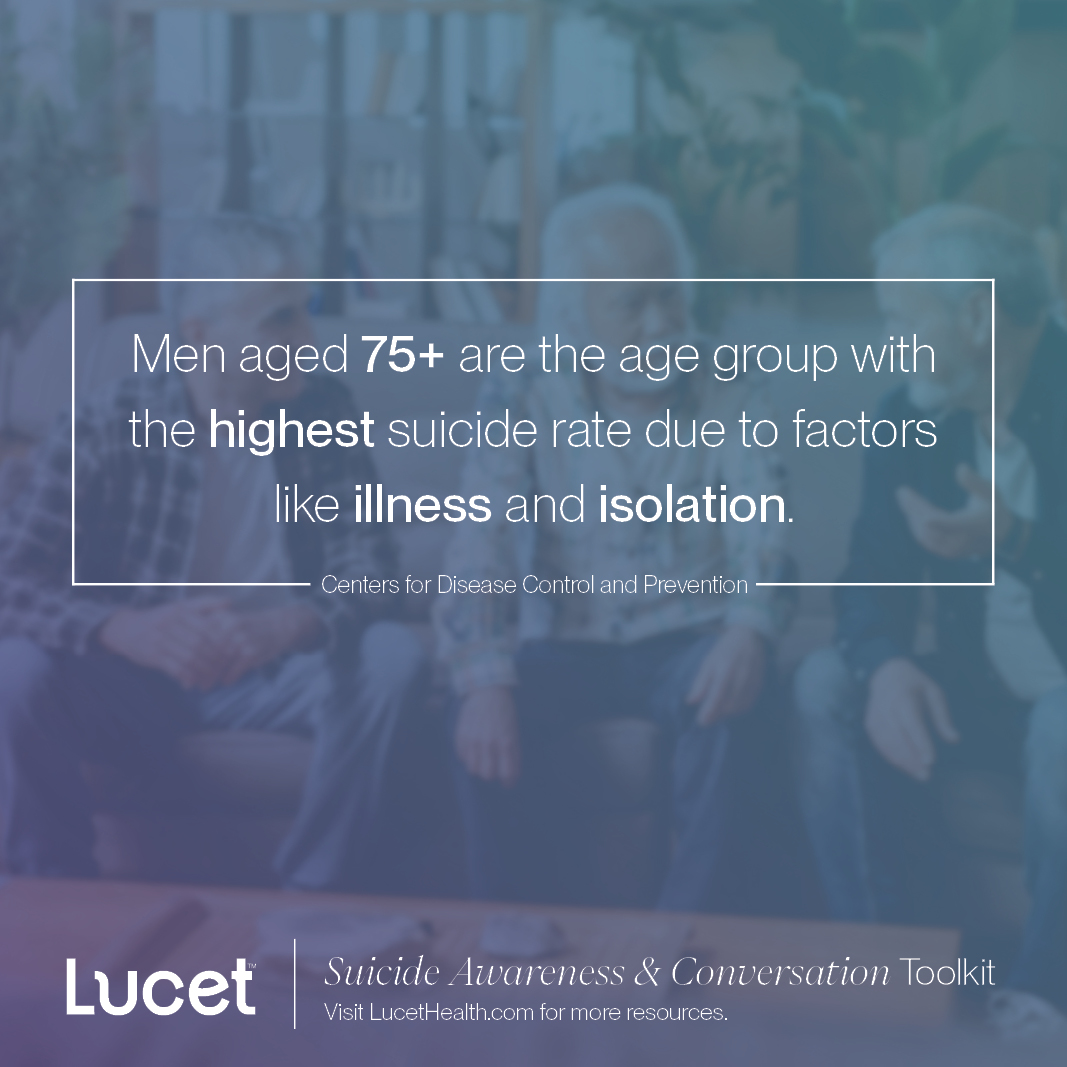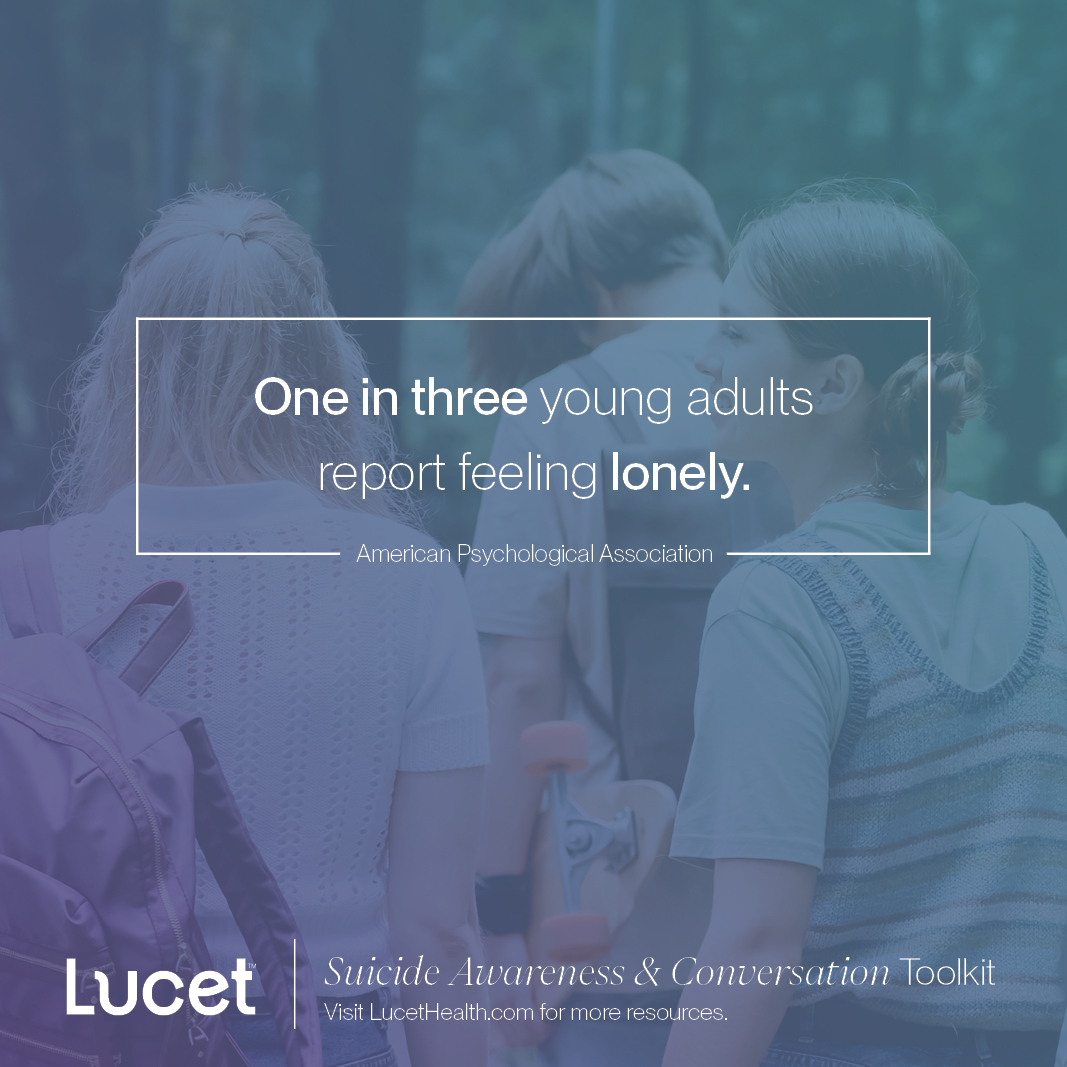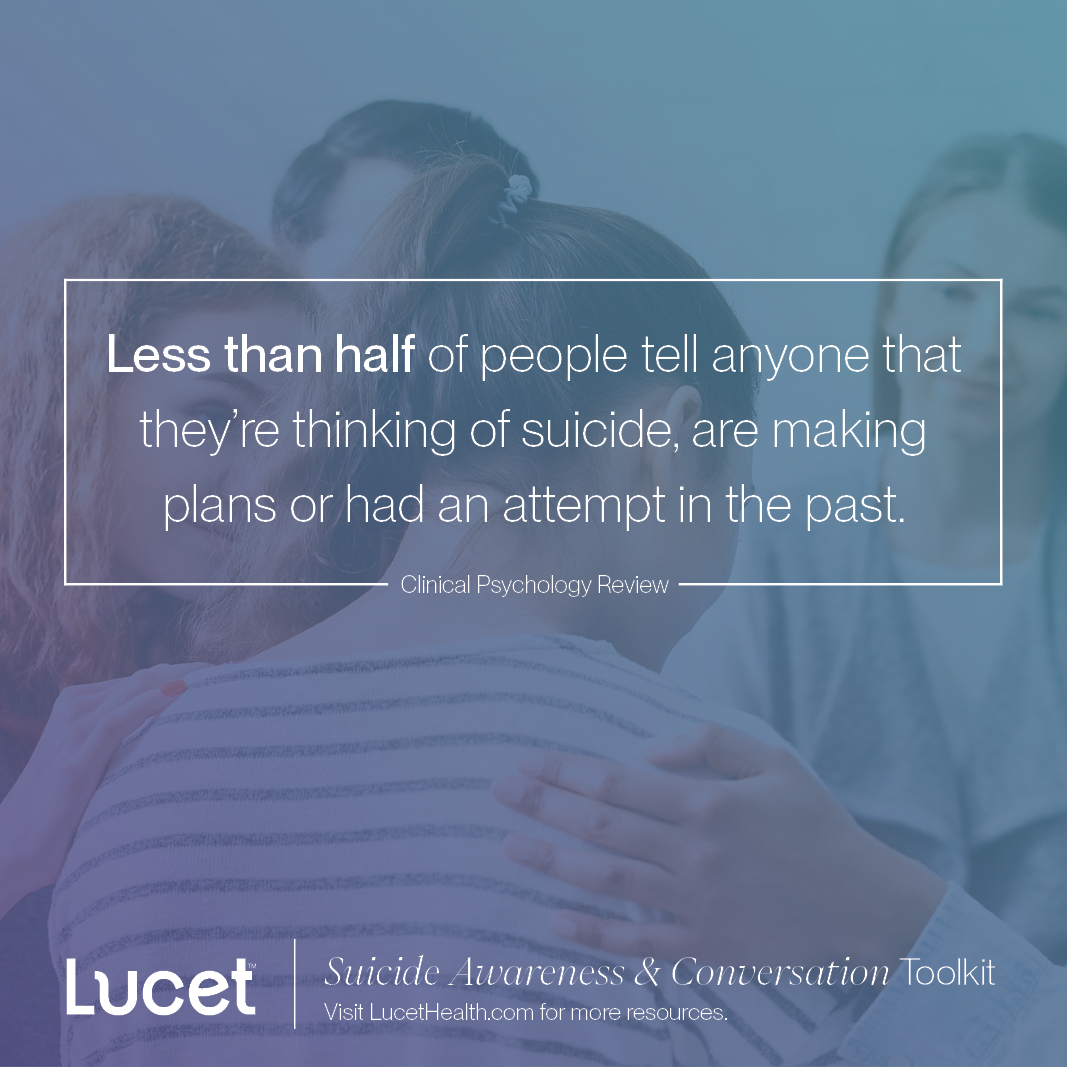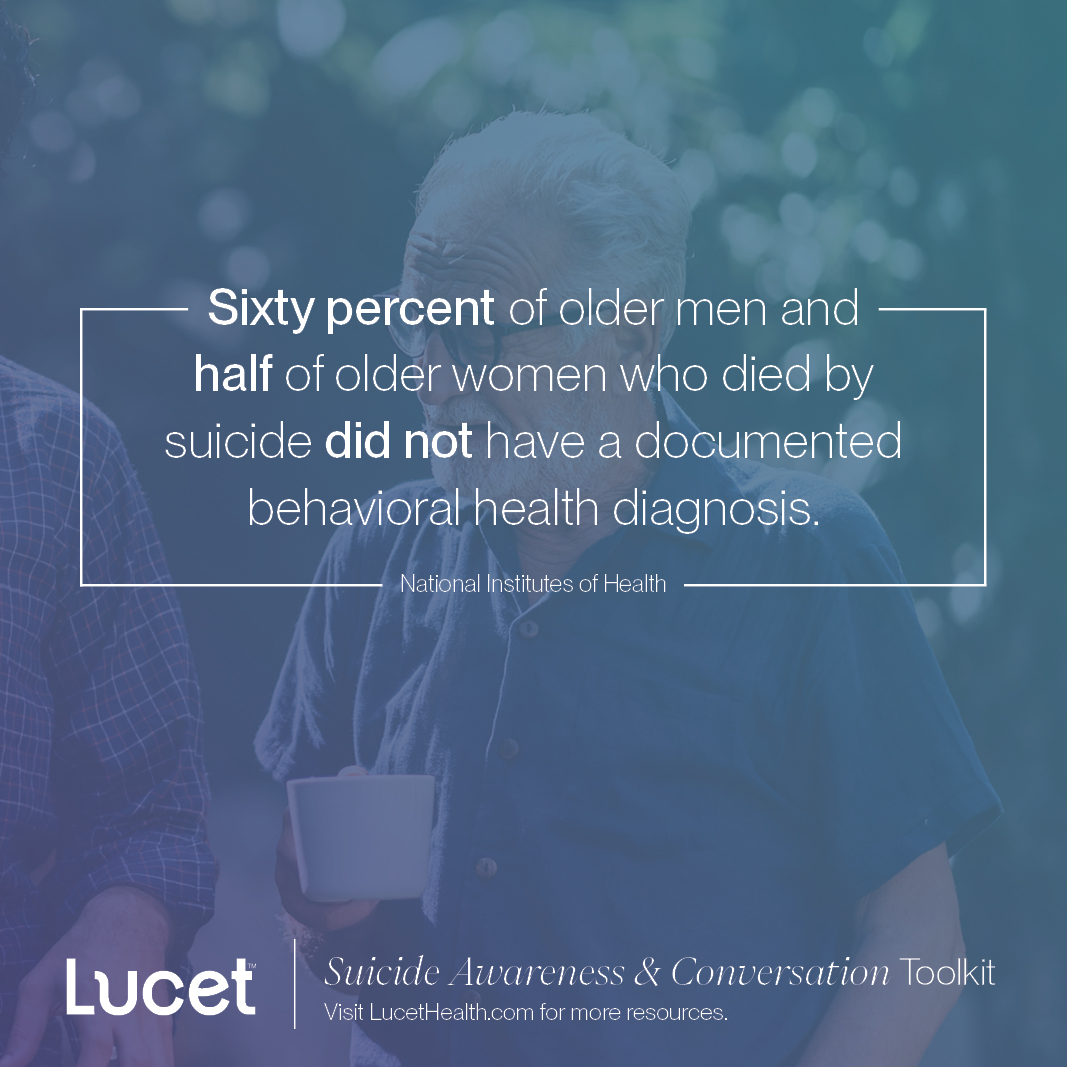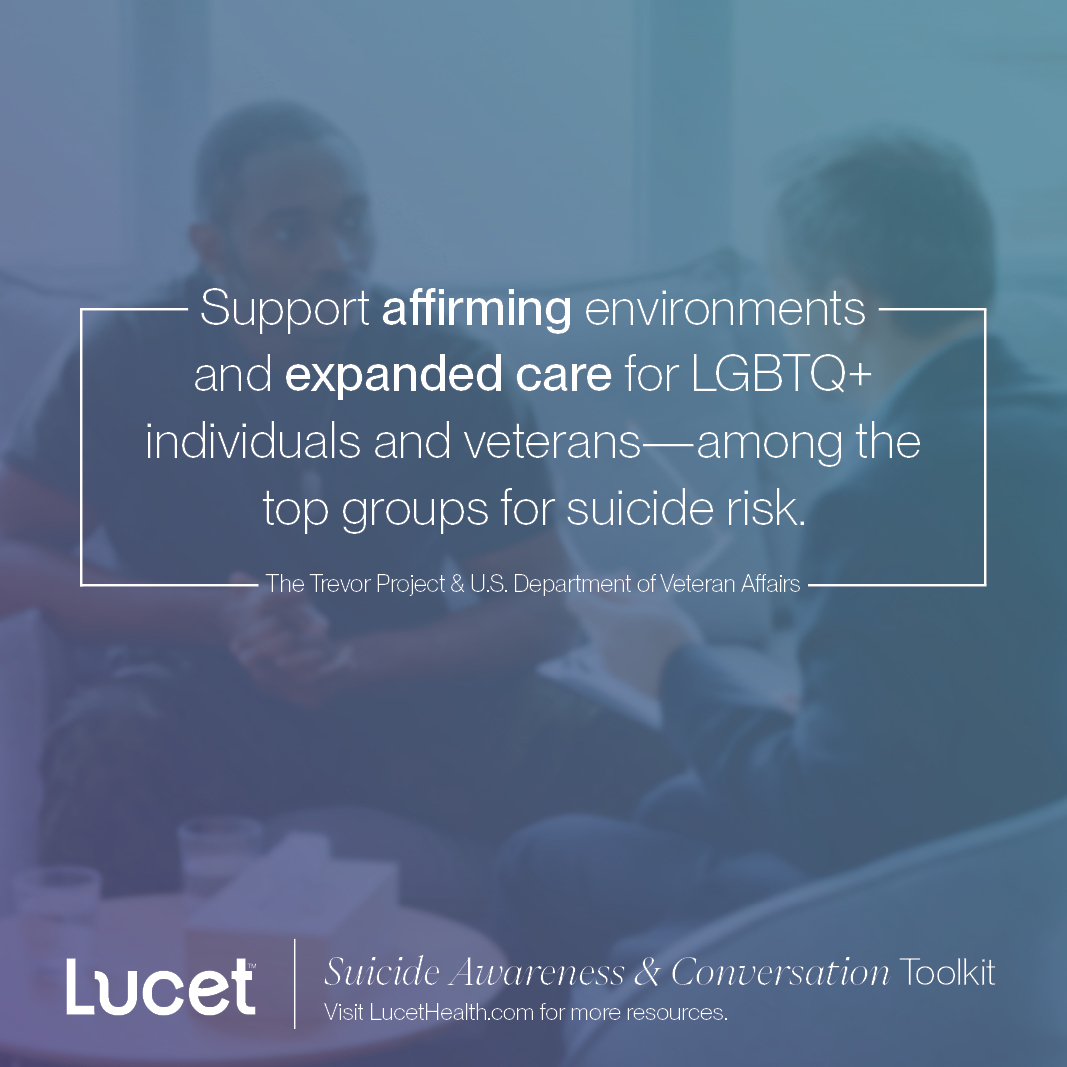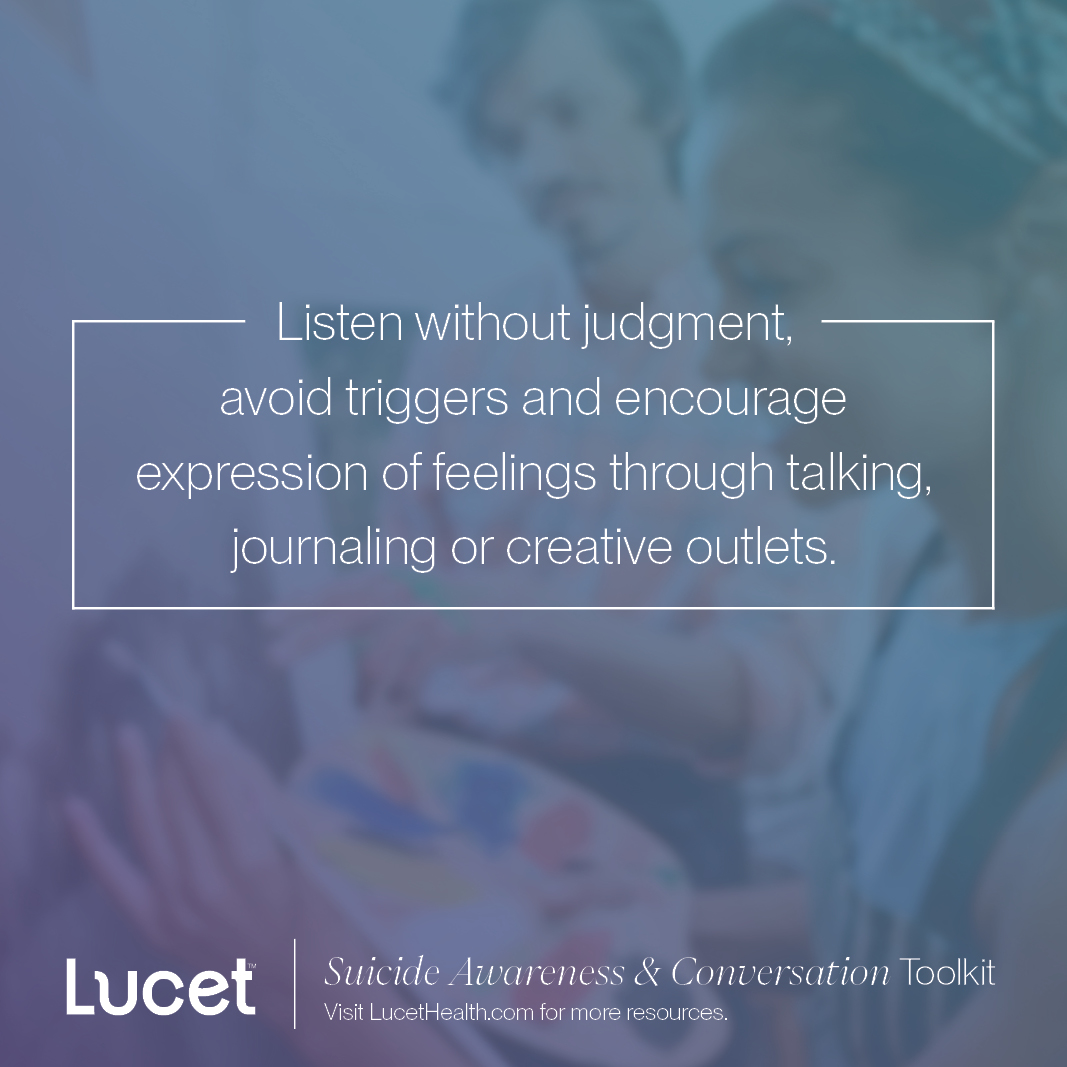Join the Conversation: Suicide Awareness Month
September is Suicide Awareness Month
Use the language below when posting about suicide awareness and prevention on social media. Follow Lucet to see our content and share it on your account. You can also follow the steps below to post from your own account.
Create posts on your social media accounts
- Log in to one of your active social media channels to create a post.
- Scroll below and choose your desired social post language.
- Copy the caption and paste it into your social post editor.
- Right click on the corresponding graphic below to save it to your computer, then upload the graphic to your post to accompany the caption.
- Be sure to tag @LucetHealth. To tag any organizations listed in the caption, type @ in the social post editor, then start typing the desired organization. Choose the organization you want to tag from the dropdown list of pages that appear.
- Include the following hashtag in your caption: #StopSuicide
- Post!
Share Infographic/Entire Toolkit
September is Suicide Awareness Month. Having open and appropriate conversation about mental health can prevent loss of life and foster daily hope, and can also help us handle guilt surrounding a suicide close to us. With the right conversation, support systems and understanding of risk, there is always someone to help.
Use our resources to learn about suicide, then share support throughout September and all year long: resources.lucet.health/toolkit-suicide-prevention
If you or someone you know is in crisis, call the National Suicide Prevention Lifeline at 9-8-8 or 800-273-8255.
#StopSuicide #SuicideAwareness #SuicidePrevention
September is Suicide Awareness Month. Having open and appropriate conversation about mental health can prevent loss of life and foster daily hope, and can also help us handle guilt surrounding a suicide close to us. With the right conversation, support systems and understanding of risk, there is always someone to help.
Use our resources to learn about suicide, then share support throughout September and all year long: resources.lucet.health/toolkit-suicide-prevention
If you or someone you know is in crisis, call the National Suicide Prevention Lifeline at 9-8-8 or 800-273-8255.
#StopSuicide #SuicideAwareness #SuicidePrevention
Share Tips
It may feel overwhelming to think about bringing up a topic as scary, uncomfortable and serious as suicide. But if you have any inkling that someone you know may be dealing with suicidal ideation, it's important to speak up and err on the side of caution — it may save their life.
Learn key phrases and approaches to speak to someone who's showing signs of suicidal ideation: resources.lucet.health/toolkit-suicide-prevention/suicidal-ideation-know-the-signs
#StopSuicide #SuicideAwareness #SuicidePrevention
Little by little, day by day, we can all contribute to suicide awareness and prevention — not just professionals. If you want to support a loved one or lwant to protect your own mental health, there are ways that you can help make hope a part of your daily routine.
Learn these practical tips for every mental health check-ins: resources.lucet.health/toolkit-suicide-prevention/practical-tips-for-suicide-prevention-making-hope-a-habit
#StopSuicide #SuicideAwareness #SuicidePrevention
The way we talk about suicide can have more of an influence on others than we may realize. For example, it's been shown that certain media coverage can increase suicide rates, especially among vulnerable groups.
Learn more about the powerful impact that language can have on suicidality and how choosing our words carefully can be a powerful way to support those around us: resources.lucet.health/toolkit-suicide-prevention/a-guide-to-speaking-sensitively-about-suicide
#StopSuicide #SuicideAwareness #SuicidePrevention
For good reason, we think we know the people closest to us in life like the back of our hand. But because people often conceal signs of suicidal ideation, particularly from those closest to them, it can be surprising to learn that they're struggling. Never take for granted that your loved one is 'fine' if you suspect something different.
Learn how to check in with close loved ones about their mental health and get them to the right resources based on their risk: resources.lucet.health/toolkit-suicide-prevention/helping-a-loved-one-who-is-suicidal
#StopSuicide #SuicideAwareness #SuicidePrevention
Share Articles
It's common for young adults to feel unsure about who they are or where they’re going, which can sometimes contribute to risk of suicidal thoughts. This is especially true during times of change, like starting high school, heading off to college or beginning a first job. It's important we check in our our youth during times these are when they may be feeling deeply overwhelmed and need extra support.
Read how to talk to a friend, trusted adult or counselor, or call/text a suicide prevention hotline if you or someone you know is feeling this way: resources.lucet.health/toolkit-suicide-prevention/understanding-suicidal-thoughts-in-adolescence-and-young-adulthood
#StopSuicide #SuicideAwareness #SuicidePrevention
If you've lost someone to suicide, you might struggle with agonizing thoughts and questions: Why didn’t I see it coming? Was there something I missed. The truth is, you can do everything “right” and still lose someone to suicide. If you’re grieving a suicide loss, your healing matters and you deserve support and compassion.
Read more about resources to help support you during this difficult journey: resources.lucet.health/toolkit-suicide-prevention/finding-peace-after-losing-a-loved-one-to-suicide
#StopSuicide #SuicideAwareness #SuicidePrevention
Our eldest Americans are facing a mental health crisis, with a suicide rate more than double the national average due to factors like loneliness, health issues and loss of loved ones. Despite this, awareness and prevention efforts for this age group remain low.
Read more about how we can foster a sense of belonging, purpose and connection in older adults who may feel isolated and are struggling to talk about their mental health: resources.lucet.health/toolkit-suicide-prevention/a-clinicians-perspective-on-aging-and-suicide-risk
#StopSuicide #SuicideAwareness #SuicidePrevention
Though suicidal ideation can impact anyone, environmental factors can put certain groups at higher risk than others. Veterans and those in the LGBTQ+ community are among these at-risk groups due to their lived experiences with trauma. If there isn't someone in their life who is helping — be that person.
Read more about how to protect those in your life who may be at higher risk for suicide: resources.lucet.health/toolkit-suicide-prevention/preventing-suicide-among-high-risk-groups
#StopSuicide #SuicideAwareness #SuicidePrevention
Whether there is someone in your life recovering from a suicide attempt or in active therapy for ideation, creating a safe and secure environment is crucial to their recovery. In addition to securing risky objects in their living space, it's imperative to foster a zone of trust so your loved one can share their feelings and express themselves openly.
Read more about how to secure a home and be an active listener to prevent suicide: resources.lucet.health/toolkit-suicide-prevention/creating-safe-and-secure-spaces-to-minimize-suicide-risk
#StopSuicide #SuicideAwareness #SuicidePrevention
#StopSuicide
Help is available right now. If you or someone you know is in crisis, call the National Suicide Prevention Lifeline at 9-8-8 or 800-273-8255.
